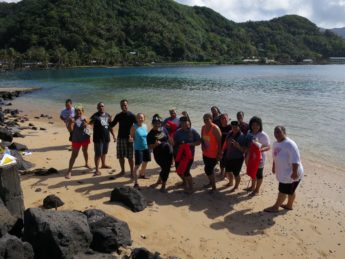Climate Science Teacher Institute
The Pacific Islands Climate Education Partnership (PCEP) is part of a regional effort to raise awareness of climate change among communities in the Pacific Islands. It has set a series of goals and strategies to develop the skills necessary to empower students and citizens to mitigate and adapt to the impacts of climate change.
As one of the PCEP’s partners, the Centers for Ocean Sciences Education Excellence (COSEE Island Earth) is taking part in the Learning and Teaching strategy and professional development program to increase educators’ science, technology, engineering and mathematics (STEM) pedagogical content knowledge and skills of climate science and adaption.
With support from the Pacific Resources for Education and Learning, COSEE-IE has formed a partnership with the Hawaii Institute of Marine Biology to develop the Climate Science Teacher Institute (CSTI) that offers science-based training across several Pacific Islands. CSTI also provides teachers with additional support as part of a virtual community where ideas and methods can be exchanged across the Pacific. The goals of the Climate Science Teacher Institute are to provide science teachers the foundations to:
- Communicate climate change science clearly and effectively to students.
- Develop the students’ capacity to critically think about climate change information.
- Navigate resources available to select accurate and reliable information to remain up to date.
We have put together the main resources the Climate Science Teacher Institute has used for its three climate change workshops in the Pacific islands: Hawai‘i, the Marshall Islands and American Samoa. We have also included an example of the agenda for a five day workshop.
Climate Science Teacher Institute – high school
Example of a 5 day workshop agenda: Agenda American Samoa
CTSI – Workshop
Day 1 – Review of climate science basics
1.1 Weather vs. Climate – Lecture
1.1 Weather vs. Climate – Activity: measuring the weather
1.2 Greenhouse gases – Lecture
1.2 Greenhouse gases – Activity: Effect of greenhouse gases
1.3 Carbon cycle – Lecture
1.3 Carbon cycle – Activity: Carbon Cycle game
1.4 Atmospheric Circulation and Tradewinds – Lecture
1.4 Atmospheric Circulation and Tradewinds – Activity: Coriolis effect and trade winds
Day 2 -Climate variability and climate change impacts
2.1 El Nino/Southern Oscillation – Lecture
2.1 El Nino/Southern Oscillation – Activity: El Nino in a tank
2.2 Sea Level Rise – Lecture
2.2 Sea Level Rise – Activity: Potato sea level rise
2.3 Tides, waves, flooding and erosion – Lecture
2.3 Tides, waves, flooding and erosion – Activity: Erosion
2.4 ENSO precipitation impacts – Lecture
2.4 ENSO precipitation impacts – Activities: Measuring evaporation, condensation, and convection
Day 3 – Effects of climate change on coral reef ecosystems
3.1 Impacts of climate change on marine ecosystems – Lecture
3.1 Impacts of climate change on marine ecosystems – Activity: Swimming Fishes
3.2 Impacts of climate change on coral reefs – Lecture
3.2 Impacts of climate change on coral reefs – Activity: Science on Sphere: Coral Reef Watch Satellite Imagery
3.3 Resilient MPAs – Lecture
3.3 Resilient MPAs – Activity:
3.4 Introduction to OA – Lecture
3.4 Introduction to OA – Activity:
3.5 Climate Task Force – Lecture
Day 4 – Monitoring, Local Governance, and Community
4.1 NOAA community resilience – Lecture
4.1 NOAA community resilience – Lecture

